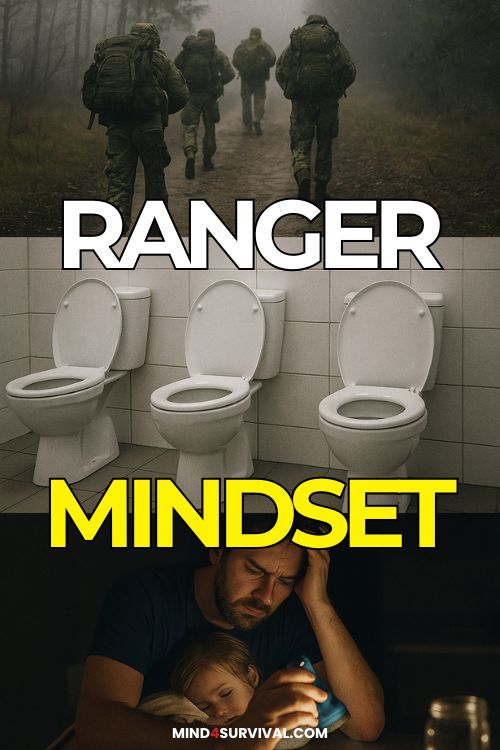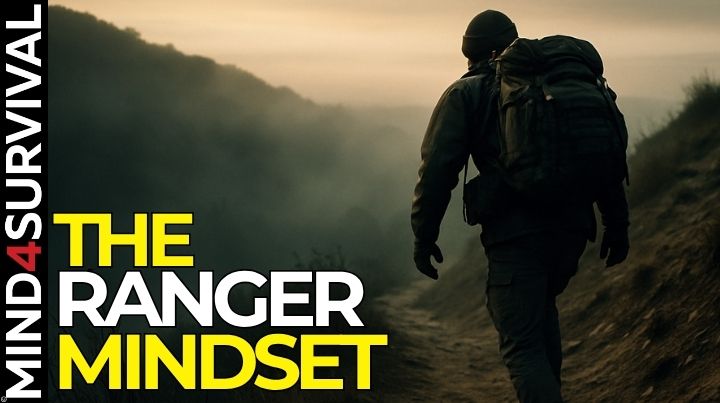The Ranger mindset is simple: don’t quit, even when quitting feels like the only option. That same mindset isn’t just for elite soldiers—it’s a tool anyone can use to push through life’s toughest moments, from disasters to daily struggles. It’s about staying in the fight—mentally—even when your body, your circumstances, or the world is screaming at you to quit. It’s not locked away behind military service or extreme toughness—it’s available to everyone. You just have to be willing to buckle down and use it when the time comes.
There was a lot that went into being a Ranger but the biggest part was mindset. You don’t need to earn a beret to have it. The Ranger mindset isn’t reserved for Special Operations veterans—it’s a mental tool every person can tap into when the chips are down. It’s a choice, and it’s one you can make any time things get tough.
Sure, you needed to be in great physical shape. And they push you past that mattering. Ultimately, it was about not quitting—especially when quitting was, at least in my case, exactly what I wanted to do. That same mindset applies to prepping for major problems. You may want to quit, but there may be too much riding on you doing your best.
Some folks might be thinking about cataclysmic SHTF events right now—and yes, mindset matters there—but it applies to everyday life too. Think about the stories of people who’ve broken down off the beaten path and had to make a herculean (aka Ranger) effort to save their family. Or people in cities who had to punch above their weight class when fighting off an attacker. Or the person caring for a loved one through years of chronic illness.
All of those people succeeded by tapping into a Ranger mindset—leaning into and overcoming the suck-fest they were stuck in. That’s what matters. Once you realize we all have that in us, the question becomes: How do we tap into it when it matters most?
TL;DR: The Ranger mindset is about refusing to quit—one second at a time. It’s a mental tool anyone can use to push through hardship and stay prepared.
Quick Look at What You’ll Learn
My Time as a Ranger
Let’s be clear—I was an AVERAGE Ranger. I wasn’t some Ranger legend. But I was a good one. I learned from some incredible Rangers like Bert Puckett, Paul Oakes, and Aaron Williamson—guys with can-do attitudes and the drive to do the impossible. I had the privilege of leading a fire team in the 75th Ranger Regiment—likely more because of staffing shortages than exceptional skill. Still, it’s something I’m proud of.
Here’s the link to the 75th Ranger Regiment.
Toilets: My First Exposure to the Ranger Mindset
I first met the Ranger mindset in basic training. At the time, I was a squad leader—basically the military version of a hall monitor. No perks, all downside. Our job? Cleaning the latrines.
That meant, every morning after PT, I had to make sure a bunch of civilians-in-uniform cleaned the showers and toilets to drill sergeant standards. And spoiler: most of them were terrible at it.
Thankfully, I’d already been a rookie firefighter in a busy station and knew how to clean a toilet. Or so I thought—until my first morning inspection. My drill sergeant, a former Ranger with a Bronze Star for valor, inspected our toilets in a way I’ll never forget. He didn’t just look them over—he stuck his entire head into each toilet bowl, inspecting the underside of the rim for turd specks. One after another.
That moment taught me something I’d never learned before: there’s another gear. An entirely different level of effort, attention to detail, and commitment. That’s where the Ranger mindset lives.
Don’t Quit: Reframing Pain and Suffering
The mindset really revealed itself during RIP—the Ranger Indoctrination Program. It was three weeks of low sleep and high suck. Think Navy SEAL hell week, but in Georgia’s woods—with fire ants instead of surf.
RIP was one big opportunity to quit. And many did. I don’t blame them. Some ended up stationed in Europe or Italy—places I sometimes wish I’d gone instead of staying in Columbus, Georgia.
It started with a duffle-bag sprint from airborne school to the RIP compound. That was just the warm-up. The cadre would then smoke us with nonstop push-ups and flutter kicks until ten people quit. Then ten more. The games were simple: suffer until someone gives up.
During that first week, my strategy was simple—make it longer than the next guy. Not one day. One minute. One second. I broke it into pieces I could manage.
That same strategy applies when life drops you into a mental meat grinder—loss, illness, disaster. And that leads to another tool I leaned on, one that’s surprisingly effective when you’re in deep: the ability to mentally check out, on purpose. Break the day into pieces you can control. Make it to the next checkpoint, then re-evaluate.
I’d Check Out—In a Good Way
On long marches or endless PT sessions, I’d mentally check out. My body kept moving. I was aware of what was happening around me, but my mind went somewhere else. I didn’t daydream about beaches—I used math. Specifically, long division.

Back in college, I was a distance swimmer. I swam the mile (1650 meters), which is 66 laps. It sucked. There’s no muscling through that—it requires mindset too. So I’d pass the time solving math problems in my head. One digit division, then two, then three. That kept my brain busy in a positive way, while my body sucked and did the work.
That same mental trick—checking out to endure something awful—helped me get selected to be a Ranger and a lot of bad days since. It’s one of the simplest, most reliable mindset tools I’ve ever had.
That’s how I learned to push through pain with mental tricks. And it’s the same mental endurance we’ll all need when things go sideways—whether that’s a multi-day power outage or caring for a loved one long-term.
What Does a Ranger Mindset Mean for You?
It means that while you may not have the physical fitness of a 20-something Ranger, you can still adopt their mindset.
That mindset doesn’t rely on biceps. It relies on refusing to give up.
It’s the parent working a second job to get their kid through college. The caregiver pulling back-to-back shifts at home and work. The prepper fixing gear by headlamp in a storm. It’s the person who keeps moving forward, no matter how slow.
Mindset is the foundation of preparedness. It decides how well you’ll use your gear, how long you’ll hold out under stress, and whether you give up when the plan fails.
So here’s the question: When has your mindset carried the day?
Share it in the comments—or hit me up in the Mind4Survival Facebook group. Let’s talk about what keeps us going when everything else tells us to stop.
Additional Resources

Read the full article here


